Translations 677
JR: Send Us Your Best May Day Selfie

Send Us Your Best May Day Selfie
Send us your best photo during the May Day activities
 By Leyanis Infante Curbelo
By Leyanis Infante Curbelo
leyanis@juventudrebelde.cu
 Maykel Espinosa Rodríguez
Maykel Espinosa Rodríguez
English Article Here
Translated and edited by Walter Lippmann for CubaNews.

Send us your best selfie during the May Day activities Author: José Raúl Concepción Published: 04/28/28/2018 | 09:51 pm
Next Tuesday will be a day of great movement throughout Cuba. It is May Day, when one of the country’s massive celebrations takes place and is joined by large sectors of the population. It’s International Workers’ Day.
Millions of workers, professionals and students will greed the sunrise, occupying their positions to participate in the traditional parade that is organized in every corner of the archipelago. It is a time to celebrate our conquests and to reaffirm our support for the continuation of the revolutionary process.
We invite you to share with us your experiences as part of this commemoration through the most personal of images: a selfie. The most original and successful will be published in the printed version of our journal.
You can send your images to our emails mirada@juventudrebelde.cu and lamiradadellector@gmail.com, or through our Facebook. Remember to attach your data, and the geographical location (country, city, municipality, neighborhood…) where the photo was taken.
So grab your camera or cell phone and meet me at the parade.
Cuba’s Close Ties to Winnie Mandela
Winnie Mandela and Cuba stand out at the United Nations
Translated and edited by Walter Lippmann for CubaNews
United Nations, 13 Apr (PL) Cuba’s permanent representative to the UN, Anayansi Rodríguez, today recalled the closeness of the people of that Caribbean island to Winnie Mandela (1936-2018) and how she was an inspiration to everyone in the world.
We Cubans saw her as someone very close to us. For us, she and Nelson have always been, are and will be indivisible, two parts of a single symbol, of the same ideal. And so we will always remember her,’ he said at a tribute ceremony.
Rodriguez recalled how the cause that this woman defended also motivated the Cubans who left their blood and sweat in the anti-colonial struggles in Africa.
Winnie will always have a special place in the hearts of Cubans, who have accompanied her struggle for more than four decades for the definitive emancipation of her country, he added.
She is also remembered as a paradigm of the unbreakable bonds of friendship and solidarity between Cuba and South Africa, forged during long years of common struggle, the Cuban diplomat said.
Faced with the immense figure of Winnie Madikizela-Mandela, Cuba renews its commitment to the noble causes of the African peoples and its will to continue to accompany them in their struggles, dreams and hopes, he emphasized.
Winnie was and is living history, she was the voice of Nelson Mandela in the streets of their country and around the world, while the apartheid regime held him prisoner for almost three decades, Rodríguez said.
This woman’s spirit of resistance aroused the admiration of worthy people and also the fear of her enemies, who could never break her, she said.
‘Mother of the South African nation’ has rightly been called, but she was much more than that: her motherly embrace transcended the borders of her homeland. With the victory of her people over apartheid, Africa was reborn and the world turned its gaze to that continent, she stressed.
In the opinion of the Cuban ambassador, this anti-apartheid fighter was an expression of the spirit of rebellion and the firmness of African women.
Mama Winnie left for immortality, to join Madiba. Next to him, to welcome her, will be Amilcar, Neto, Machel, Lumumba, Sankara, Nkrumah and many other builders of African independence.
The Cuban diplomat offered her heartfelt condolences and sincere feelings of solidarity with her family and with the Government and people of South Africa.
Winnie Madikizela-Mandela is remembered as a tireless freedom fighter in South Africa and a symbol of resistance against the apartheid regime.
The anti-apartheid fighter died on 2 April at the age of 81 in Johannesburg and was buried with the honours of a head of state on 7 April.
pgh/ifb
High Honors to Winnie Mandela
South Africa Bids Farewell to Winnie Mandela with High Honors
Translated and edited by Walter Lippmann for CubaNews.
Pretoria, 14 Apr (PL) South Africa today bid its final farewell to veteran anti-apartheid fighter Winnie Mandela, with a mass funeral ceremony in Johannesburg and a burial reserved for heads of state and government.
The coffin with her remains was moved from Winnie’s residence to nearby Orlando Stadium in the Soweto neighborhood, followed by a procession led by her daughters, grandchildren, sisters and relatives, accompanied by President Cyril Ramaphosa, as well as other leaders and personalities.
At dawn there was a ceremony at the family home, where her body was laid out, a sermon was given and the coffin was covered with the South African flag.
In his eulogy, Ramaphosa stressed that she spoke when others were silent, was able to mobilize and lead South Africans against apartheid when others were forced into exile, had great courage and commitment and was not able to be silenced or frightened by the racial segregation regime, despite all the actions taken against her.
He pointed out that Winnie herself had to heal her wounds for most of her life, although she was always willing to relieve those of her country.
The president pointed out that she was the symbol of the resistance and considered a threat by the apartheid regime, and defied all attempts against her and could not silence or frighten her.
He recalled that Mama Winnie offered leadership in the most difficult times of apartheid without expecting compensation because her conscience and convictions left her no choice but to resist.
The Mother of the Nation died, but she is with us, she lives in the poor, in the workers, in those who are abused…, in the conscience of the apartheid security agents for everything they did to her,” said Ramaphosa.
He wished Winnie an eternal rest in peace after a long career in this life.
The remains of this woman, considered the Mother of the Nation, were taken from the funeral home to her residence on Friday afternoon and thousands of people along the way paid posthumous tribute to her.
Tens of thousands of South Africans filled the Orlando sports facility early in the morning, with the participation of President Ramaphosa and the heads of state of the Republic of Congo, Denis Sassou Nhuesso, and of Namibia, Hage Geingob, as well as U.S. human rights activist Jesse Jackson, among many other personalities.
Numerous speeches were made in Mama Winnie’s honor during this mass farewell. These included those by Filike Mbabula on behalf of the African National Congress, Bathabile Dlamini as leader of her Women’s League, the Minister of Energy, Jeff Radebe, representing the family, and the head of the Gauteng province government, David Makhura.
Also speaking was Julius Malema, leader of the Economic Freedom Fighters opposition party (EFF), an organization that on Wednesday paid tribute to Winnie with a memorial in the province of Estado Libre.
Her daughters Zindzi and Zenani, her sisters and two grandchildren, one of whom read the obituary, also paid their respects to the crowded audience. They sang in honor of this courageous woman who became the face of South Africa during the years of repression of the apartheid regime.
Her daughter Zenani Dlamini thanked her for the many expressions of pain, affection and support she had received since Winnie’s death on April 2 and said,’I am here to mourn my mother and also to celebrate her life.
Her own was one of the most particular recent stories because she was able to confront one of the most evil regimes of the last century and triumphed,’ she said.
The final tribute to Winnie, which lasted more than four hours, ended with a sermon that gave way to military honors by heads of state and government before the procession headed for Fourways Memorial Park Cemetery in Johannesburg.
ocs/ir
Nicaraguan gov’t thanks Bishops Conference

Nicaraguan government thanks Bishops’ Conference for mediation
Previously, the Episcopal Conference had accepted in a communiqué the role of mediator and witness of the dialogue proposed by Ortega, faced with the situation of violence experienced in recent days in the country.
Published: Wednesday 25 April 2018 | 09:57:14 AM
By Juventud Rebelde
digital@juventudrebelde.cu
A CubaNews translation.
Edited by Walter Lippmann.
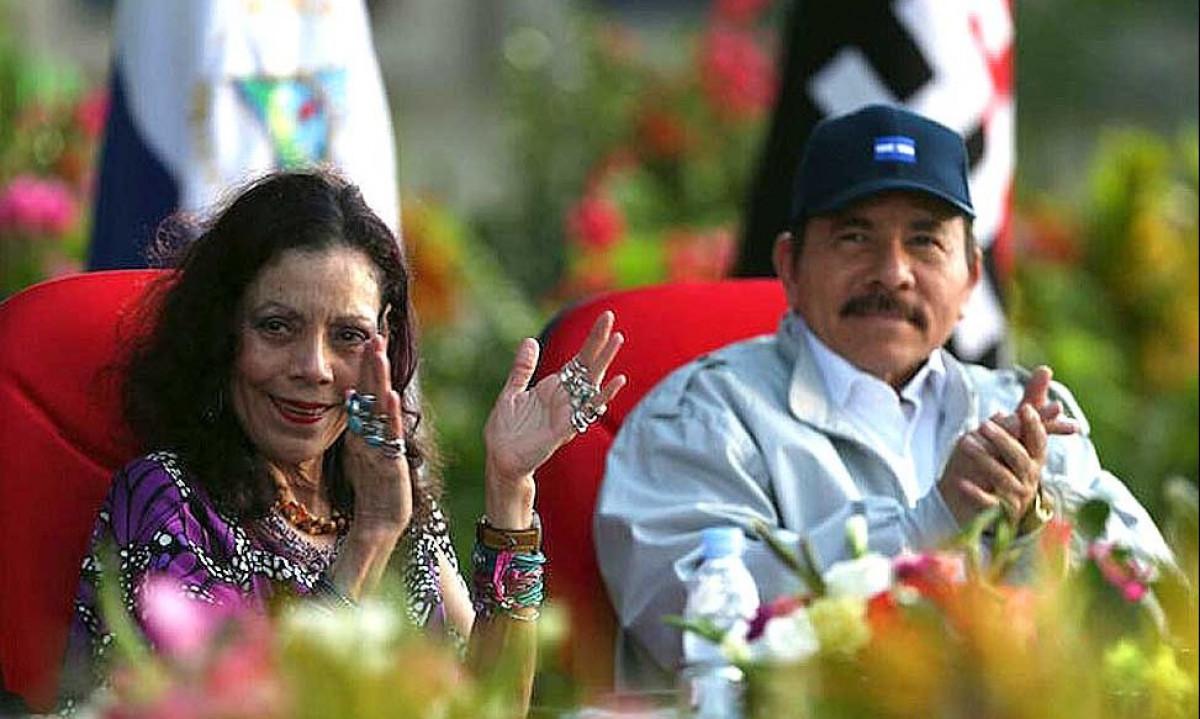
The President and Vice President of Nicaragua sent a message of congratulations to Raúl and Díaz-Canel. Author: La Voz del Sandinismo Published: 20/04/2018 | 04:53 pm
MANAGUA, April 24.- The Government of Nicaragua thanked the Episcopal Conference on Tuesday for its willingness to participate as a mediator and witness to the dialogue convened by the President of the Republic, Daniel Ortega, to restore order and peace in the country.
We are deeply grateful for the willingness of Cardinal Leopoldo Brenes and all the bishops to continue to contribute to the meeting, tolerance and peaceful coexistence in our country, according to PL.
The text, read by the Vice-President, Rosario Murillo, also fully shares the proposal of sectors that could participate in the national dialogue sessions, in addition to others.
“Once again, our gratitude, on behalf of the Nicaraguan families and the Government of Reconciliation and National Unity, for their willingness to participate as mediators and witnesses in these important events in Nicaragua’s present history,” the message underscores.
Previously, the Episcopal Conference had accepted in a communiqué the role of mediator and witness of the dialogue proposed by Ortega, faced with the situation of violence experienced in recent days in the country.
On Sunday, the president invited Cardinal Brenes and a delegation of bishops to accompany the dialogue by announcing the repeal of the social security reforms that, he said, served as a trigger for the violence.
In the last few days, Nicaragua experienced great social tension, unprecedented in more than a decade.
It all began when protests against the aforementioned reforms were infiltrated by alleged criminal groups and vandals incited by the right wing for general anguish and instability in the country, according to reports.
In an appearance before the people, Ortega recognized the minority’s right to criticize, but not to conspire to destroy, promote violence, and worse still, to seek out the most extremist and racist political groups in the United States to finance destabilization plans.
Nicaragua: The New Prisoner

Nicaragua: The New Prisoner
Like a herd of hungry wolves, hemispheric organisms of different stripes, but of the same kind, open their jaws and throw their claws at the violent events that have taken place in Nicaragua.
Posted: Saturday 28 April 2018 | 08:39:57 PM
 By Marina Menendez Quintero
By Marina Menendez Quintero
marina@juventudrebelde.cu
A CubaNews translation.
Edited by Walter Lippmann.
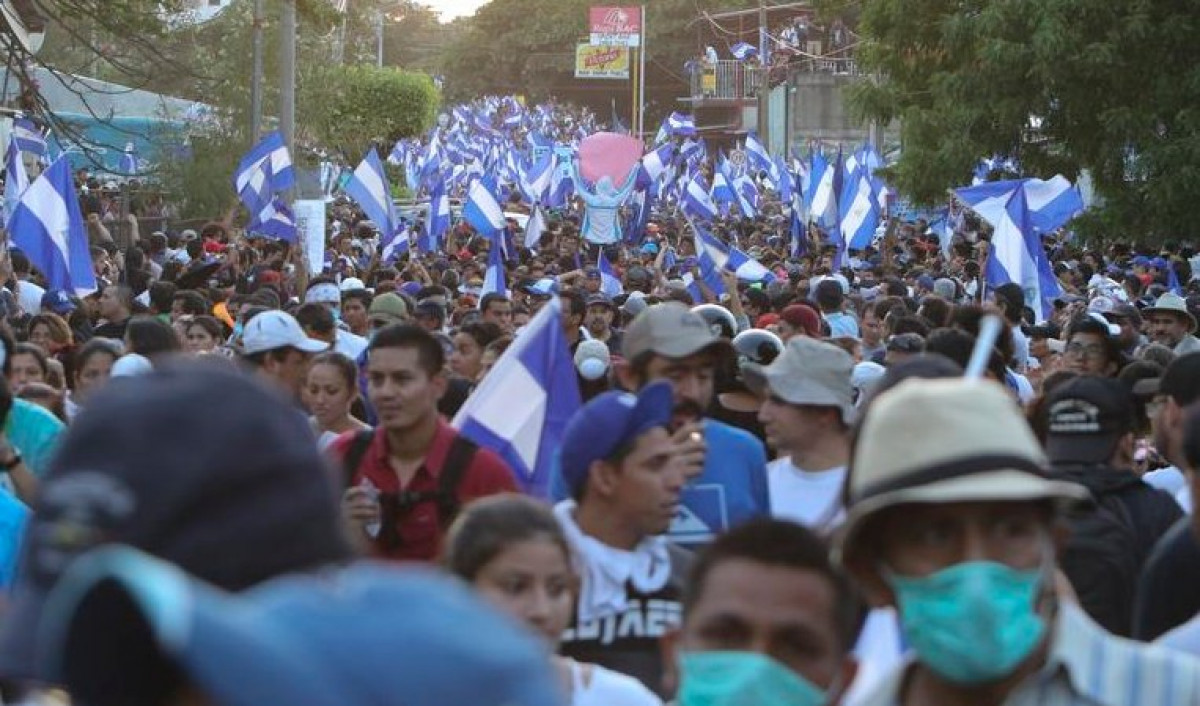
A march for peace, last Monday, extended over 6.5 kilometers in Managua, the capital Author: El Nuevo Diario Published: 04/28/2018 | 08:01 pm
“The herd” is a term coined in Spain these days that identifies, in an incriminating tone, a group of five young men who are accused of raping a girl… even though they have been tried and convicted by the courts for violence alone.
They could have been christened with that nickname because of the way they acted, like wolves in a group. Or by force.
Thus, like a herd of hungry wolves, hemispheric organisms of a different stripe, but of the same kind, open their jaws and throw their claws at the violent events that have taken place in Nicaragua.
Their very identification gives rise to conjecture about the sincerity of their concerns, and allows them to guess what it is that they crave.
The biased Humans Right Watch already calls for a meeting of the Permanent Council of the OAS, so that the presence of a representative of the draft Inter-American Commission on Human Rights may be applied to Nicaragua.
IDEA – the so-called Democratic Initiative of Spain and the Americas, which brings together former right-wingers, conspirators and interferers – also called on the head of the OAS, the discredited Luis Almagro, to promote the adoption of measures within the framework of the so-called Inter-American Democratic Charter, created by the United States to justify certified intervention in other nations.
And it should come as no surprise that in Miami the congressional far-right is calling for a tightening of sanctions established by the NICA-ACT (Nicaraguan Investment Conditionality Act of 2017).
But what best allows us to feel the magnitude of that which is being woven against the Sandinista government, and where it is coming from, is Washington’s attitude. By order of the State Department, its Embassy in Managua pulled out its staff and closed it, while “alerting” U.S. citizens not to travel to the country, in a wake-up call that should be taken into account.
In a statement of harsh and little-used epithets in diplomacy – so similar to those of President Donald Trump’s verbiage – the White House on Friday spoke of “repugnant political violence” that “has impacted the international democratic community.
Meanwhile, on social networks and in the right-wing international media, where so many errors are made, the reasons that gave rise to the facts hardly exists any more. Gone is the social security reform that sparked the riots and was repealed by the government a week ago, almost immediately after its enactment. The point now is to keep up the protests.
A Twitter account cited by the website Misión Verdad for its suspicious appearance along with the demonstrations and which identifies itself as SOS Nicaragua, continued to call for insubordination this Saturday with this message: “How disappointing that we are surrendering so quickly for the sake of “tranquility.” That it is disappointing that all those who died have died so quickly for us to surrender. You don’t have to have conflict in the streets to keep fighting.”
Thus, a situation of supposedly social origin has turned into a political crisis that seeks to give rise to foreign intervention and the demise of the Sandinista government.
The speed with which events that seem to have come out of nowhere flowed evokes a magic art, even if there is no such thing. Rather, it seems to be the maneuvering of a well-oiled machinery that, as in other nations that are victims of the US and pro-imperial right-wing animosity, sadly uses young students as cannon fodder for violent acts that oblige the forces of law and order to act. This makes it easier to blame the executive branch for the deplorable deaths and to justify the adoption of hemispheric pressure measures.
In theory, everything already has a name and has been applied in Eastern European countries to remove goverments which make Washington uncomfortable, just as they tried to apply it to Venezuela. The so-called “color revolutions” that lead to what has been called a soft coup, that is, the demise of a president without the use of bayonets and military boots.
It was not promoted in left-wing theory. It is written in Pentagon documents and is a well-thought-out imperial strategy, as noted in the November 2010 Special Operations Forces Training Circular 18-01, entitled The Un-Conventional War.
In each place with its own characteristics, the executives of Fernando Lugo in Paraguay, Manuel Zelaya in Honduras, and Dilma Rousseff in Brazil can attest to this, without leaving out the saga of corruption and the unjust imprisonment plotted against Lula. The issue is regional, and it is a question of completing the shift to the right, manipulation by means of a population as victimized as the political subject who is demonized.
Within Nicaragua, the alignment, on the side of instability, of the Council of Private Enterprise (Cosep), an ally of the executive in this Sandinista term, although its old and very bitter enemy, also sheds light on who can prosper from these undesirable events, even though they have not yet been clarified, and where an Episcopal Conference continues to play a fundamental role, which has agreed to be the guarantor of the dialogue called for by the Government, but is cited as its criticism of the facts.
Leaders of the Unen (National Union of Students of Nicaragua) denounced the presence in one of the universities taken over by the demonstrators of members of the opposition Sandinista Renewal Movement, where figures who left the ranks of the FSLN gather, and their pressure on the young demonstrators to remain in revolt.
In a statement by the Sandinista Front, which was not widely disseminated, the ruling party has given elements of judgment. For example, the fact that the protests were initiated and led by university students, especially from private religious schools – basically the UCA, the Jesuits and the Polytechnic (Upoli), of a Protestant church based in the USA.and its adoption of a violent character with the use of homemade mortars; the mobilization of the Sandinista Youth as a counterpart; the assaults and fires of representative Sandinista premises and State institutions and Sandinista houses, as well as the looting of supermarkets and warehouses, among them the one that kept all the medicine of the insured….
The establishment of a Truth Commission announced on Friday by the Nicaraguan National Assembly should, hopefully soon, clarify the interim events, and the dialogue called for by President Daniel Ortega should restore the stability that has characterized the last decade in Nicaragua.
But everything must be resolved from within. The herd of Washington-protected institutions seeking intervention must remove their teeth from their new prey.

The protests led to violent acts that served as an excuse for interference and demonization. Photo: AP
Cuba’s Solidarity with Nicaragua

Cuba Reiterates Solidarity with Nicaragua
The Ministry of Foreign Affairs of the Republic of Cuba denounces the attempts to destabilize the Republic of Nicaragua, a country that lives in peace and where remarkable social progress has been achieved.
By Juventud Rebelde
digital@juventudrebelde.cu
Posted: Saturday 28 April 2018 | 08:54:30 PM
A CubaNews translation.
Edited by Walter Lippmann.
The Ministry of Foreign Affairs of the Republic of Cuba denounces the attempts to destabilize the Republic of Nicaragua, a country that lives in peace and where significant social, economic and security progress has been made in favor of its people.
The Ministry of Foreign Affairs of Cuba reaffirms its commitment to the principles of the Proclamation of Latin America and the Caribbean as a Zone of Peace, signed by the Heads of State and Government during the Second Celac Summit in January 2014, and rejects interference in the internal affairs of that sister nation.
The Ministry of Foreign Affairs supports the sovereign efforts of the Sandinista people and Government of Nicaragua, chaired by Commander Daniel Ortega Saavedra and Vice-President Rosario Murillo Zambrana, to preserve the dialogue, peace and well-being of Nicaraguans.
Havana, April 28, 2018
The US and its Bad Neighbor Policy

The US and its Bad Neighbor Policy
By Lazaro Farinas
Posted: Monday 23 April 2018 | 09:31:55 PM
A CubaNews translation.
Edited by Walter Lippmann.
“Speak softly and carry a big stick, so you can go far.” That is the definition of the Big Crow’s policy implemented by President Theodore Roosevelt at the beginning of the last century. What became known as the Roosevelt Corollary established that “if a European country threatened or endangered the rights or property of US citizens or businesses, the US government was obliged to intervene in the affairs of that country to ‘reorder’ it”.
With the implementation of this Corollary, the American President was actually putting into practice the doctrine that James Monroe, who was the fifth president of this country, had proclaimed before the Congress in 1823. “America for Americans,” the president told the congressmen and the world. Of course, you have to understand that for Americans, Americans are Americans. Roosevelt, with his big stick, gave free rein to this country’s interventions in Latin America. Just a few weeks ago, former Secretary of State Rex Tillerson made a public statement that the old Monroe Doctrine was still in force.
Many countries have been invaded by U.S. military forces since Monroe proclaimed his famous doctrine, but even more have been the ones that have secretly suffered this country’s interventionism in its internal affairs; many governments overthrown in one way or another, many were the military dictatorships established with his support, many were the pressures to overthrow democratically elected rulers.
Fortunately, military interventions have disappeared from the hemisphere, but have been replaced by conspiracies, pressure and sanctions. Many Latin American countries have received and continue to receive this form of interference.
Venezuela and Cuba are classic examples of this approach, but countries such as Honduras, Brazil, Paraguay, Bolivia, Nicaragua and others cannot be left behind.
What is happening with Venezuela is incredible. The United States and its allies in the region and the Western world have mounted a campaign of disinformation about the homeland of Simón Bolívar and his government that is on the edge of infamy. Ever since the late Commander Hugo Chávez became president of that country through fully transparent and democratic elections, the United States and its international right-wing cronies began mounting a disinformative campaign against him and his government. In reality, they did not settle for anti-Chávez propaganda in the national and international media, but from there, they went on to practice, with a coup d’état, an oil strike, unbridled violence in the streets, etc.
The Venezuelan government is accused of everything in international organizations, in the discredited OAS, in the forums of the United Nations, in Unasur, now it has just been vetoed at the Summit of the Americas and in the Washington Congress, measures are being taken and sanctions are being created against the rulers of that nation.
The country that has set a record for holding democratic elections is accused of being an infamous dictatorship. A country that has held 20 elections in less than 20 years in power, fair and transparent elections, elections that have been supervised and observed by foreign organizations. They accuse the government of fraud in these elections, but we must ask ourselves, how is it that by fraud they lost the elections that took place a few years ago to elect the National Assembly?
According to them, Nicolas Maduro is an ironclad dictator, but how is it possible for such a dictator to accept freedom of the press, from which he is subjected to dirty campaigns. The right always says the same thing and uses the same speeches. When Donald Trump was running for president of the United States, he got tired of proclaiming that the American electoral system was fraudulent, but when he won the elections, he did not mention the issue any more.
Now that presidential elections are to be held again on 20 May in Venezuela, an international campaign has already begun to discredit them, despite the fact that several opposition candidates are running for the presidency. All the polls are giving it to Maduro as a winner, but what if an opposition candidate wins? Would they do like Trump did?
I don’t know if the day will come when a U.S. government will stop thinking of Latin America as its backyard and start to respect it. It is my hope that the day will come when you will truly forget what you have done so far and come to the conclusion that you must relate to that region with respect, that you will forget the Monroe Doctrine and the Big Club and that you will erase the carrot and stick theory. Because I love this country where I have lived for so many years and because I love Latin America, the region where I was born, I do not lose hope. Maybe I’m daydreaming.
Silence is not an option

In the face of gender-based violence, silence is not an option
Although in the First Workshop on Communication, Gender and Equity, organized by the Oscar Arnulfo Romero Center, the FMC and the National Center for Sexual Education, which took place in the province of Ciego de Ávila, progress was recognized in a series of stereotypes and prejudices , it is a priority to continue working to address the problem of physical, psychological, sexual or economic violence, in a transversal and multisectoral manner
Posted: Friday 27 April 2018 | 04:51:01 PM
 By Yuniel Labacena Romero
By Yuniel Labacena Romero
digital@juventudrebelde.cu
A CubaNews translation.
Edited by Walter Lippmann.
CIEGO DE ÁVILA: About ten women out of 30 reported having received some kind of physical, psychological, sexual or economic violence for 12 months, according to the Survey on Gender Equality, conducted in 2016 by the Federation of Cuban Women (FMC), which also revealed a low perception of this problem in our society.
These data demonstrate the urgent need to accompany, make visible, analyze, explain and systematically put the issues associated with gender violence in all areas of society, especially in the media, given their social function and scope.
It is precisely with this aim in mind that the First Communication, Gender and Equity Workshop, organized by the Oscar Arnulfo Romero Center, the FMC and the National Center for Sex Education, has been held to date, bringing together some 40 media professionals and actors with an impact on the public sphere from almost every region of the country.
During the days of debate, Cuban advances in a series of stereotypes and prejudices were recognized, but also that silence is not the option in the face of gender violence. The participants argued this statement, since this problem is often a hidden, naturalized, invisible fact, which is framed in a patriarchal culture. And in most cases, women are in a position of subordination to men, making them more vulnerable.
Tackling this problem should not remain a matter of slogans or tasks. There is a need to develop broader strategies that contribute to greater production and positioning of educational materials that reflect gender gaps and equities, as well as better implementation of public-good campaigns on the issue, the experts said.
Mareleen Díaz Tenorio, researcher for the Oscar Arnulfo Romero, explained that recognizing how acts of gender violence are evident is, in the first instance, the key point of how society and the media can achieve, together, the identification of this problem that affects a group of the unjustly called “weak sex” in the country.
It is essential to create awareness, consensus and political will so that all social actors can participate in this process. The longer we take to begin to transform, the more people will continue to suffer. Only respect for human beings will allow us to live in that better world that we need, the specialist said.
At the workshop – dedicated to the memory of Dr. Isabel Moya Richard, who was director of the Women’s Publishing House who was highly knowledgeable and a defender of gender issues – Eres más, a Cuban campaign for non-violence against women and girls, was presented, and the need to target specific actions at adolescent and youth audiences for their role in society was reiterated.
Women’s Soccer Wants More

Women’s Soccer Wants More
The coach of the Cuban women’s football team, Renier Bonora Peñalver, says he is satisfied with the progress made by his students in recent years.
———————————————————————————
Author: Yosel E. Martínez Castellanos | yosel@granma.cu
27 April 2018 00:04:44
A CubaNews translation.
Edited by Walter Lippmann.
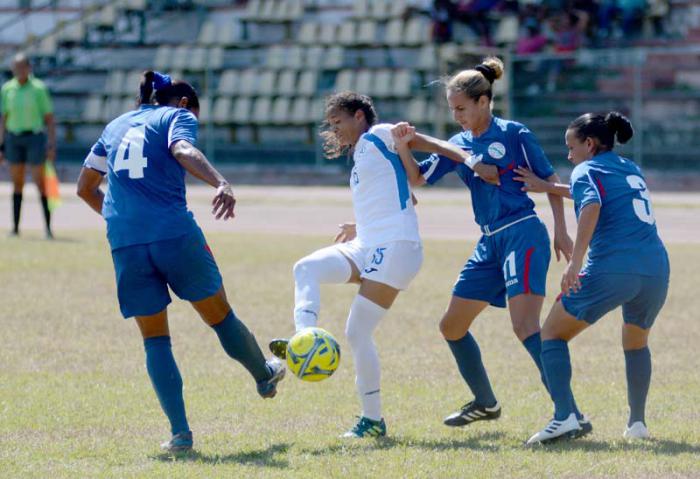
Cuban women will be looking for a ticket to the 2018 Caribbean Cup in May. Photo: Ricardo López Hevia
The coach of the Cuban women’s football team, Renier Bonora Peñalver, says he is satisfied with the progress of his students in recent years.
The Camagüeyan strategist is an “old-school” man who has always been known for his commitment to the progress of his students, beyond the 90 minutes of each game and training practices.
“I say that I am not happy because there is always work to be done, to emphasize technical elements. These young women have a great future, they just need to believe it. We as coaches put all our knowledge to work for them, and they can do more,” said the mentor, who has been at the helm of the Cuban cast for three years.
In an interview with this newspaper, Bonora Peñalver said that, despite being in charge of a young squad, in recent years there has been sustained growth in Cuban women.
“The way we move on the court, with or without a ball, is very different from how we did it a couple of years ago. The players are already playing plays that we made during the training sessions,” she said.
This gradual evolution has led coaches to consider starting to implement the 3-4-3 game system, to the detriment of the 4-3-3-3 system they currently use. This change is due, according to Bonora Peñalver, to the fact that several players have refined their technique, both in defense and attack.
“Today’s philosophy is very different from that of the past, when we were looking for women who were fighters and who did a great deal of sacrificial work on the ground. At the moment we prefer them to come in with a good technique, to instill in them a way of playing together.
For Cubans, the immediate goal is to qualify for the 2018 Caribbean Cup, so in May they will be looking for the only ticket in the Dominican Republic, where they will have to compete against the Turks and Caycos Islands, Puerto Rico, Anguilla and the quisqueya hosts.
“We can take that quota. We played a couple of friendly matches two weeks ago against Nicaragua, who are one of the strongest opponents in the Central American area, and our players were in good physical condition, with several chances on goal.
New IAAF action provokes protest

New IAAF action provokes protest
The IAAF noted that as of the 1st. Athletes participating in events ranging from 400 meters to 1 mile in November may not exceed five nanomoles per liter of testosterone in their blood, the DPA agency reports.
Author: Sports Editor | deportes@granma.cu
27 April 2018 00:04:02
A CubaNews translation.
Edited by Walter Lippmann.
Caster Semenya, the double Olympic title holder in the 800 metres. Photo: stevehaag.photoshelter.com
MONACO – The International Association of Athletics Federations (IAAF) has set a new limit for the participation of women with high testosterone levels in its competitions.
The IAAF noted that as of the 1st. Athletes participating in events ranging from 400 meters to a mile in November may not exceed five nanomoles per liter of testosterone in their blood, the DPA agency reports.
Until now, the tolerance threshold for testosterone levels was 10 nanomoles per litre and will now be halved because, according to studies referred to by the IAAF, a higher proportion “increases muscle mass by 4.4%, strength by 12-26% and haemoglobin by 7.8%”.
Athletes who have a higher natural level should use hormonal contraceptives for six months to stay within the authorized limits.
“The new rules seek to level the playing field to ensure fair competition in athletics, where success is determined by talent, dedication and hard work and not by other factors,” said IAAF President Sebastian Coe of Britain.
ANGRY REACTION
Against the backdrop of the announced decision, South Africa turned out to support its runner Caster Semenya, two-time Olympic champion in the 800 meters, and the South African government said the new regulation would force women athletes with high natural testosterone production to reduce it is a “witch hunt” against them, according to EFE.
“This unfortunate and intentional decision is, at best, a witch hunt against our athlete Caster Semenya,” said South African Sports Minister Tokozile Xasa.
The Minister expressed “disappointment” and “disgust” with the IAAF measure. Xasa wondered if the decision is not a way to try to diminish the dominance of African athletes in the medals and called on South Africans to express their opposition to these new rules “designed to disadvantage” their athletes, the Spanish news agency concludes.
=======================
TRANSLATOR’S NOTE:
DPA is the German Deutsche Presse-Agentur GmbH.news agency.
EFE is a Spanish news agency.
Subscribe to Blog via Email
| M | T | W | T | F | S | S |
|---|---|---|---|---|---|---|
| 1 | ||||||
| 2 | 3 | 4 | 5 | 6 | 7 | 8 |
| 9 | 10 | 11 | 12 | 13 | 14 | 15 |
| 16 | 17 | 18 | 19 | 20 | 21 | 22 |
| 23 | 24 | 25 | 26 | 27 | 28 | |

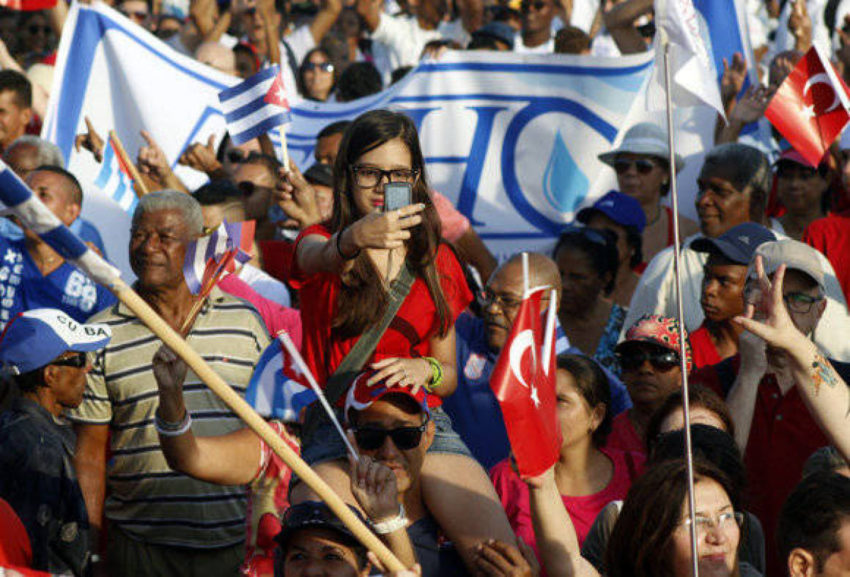
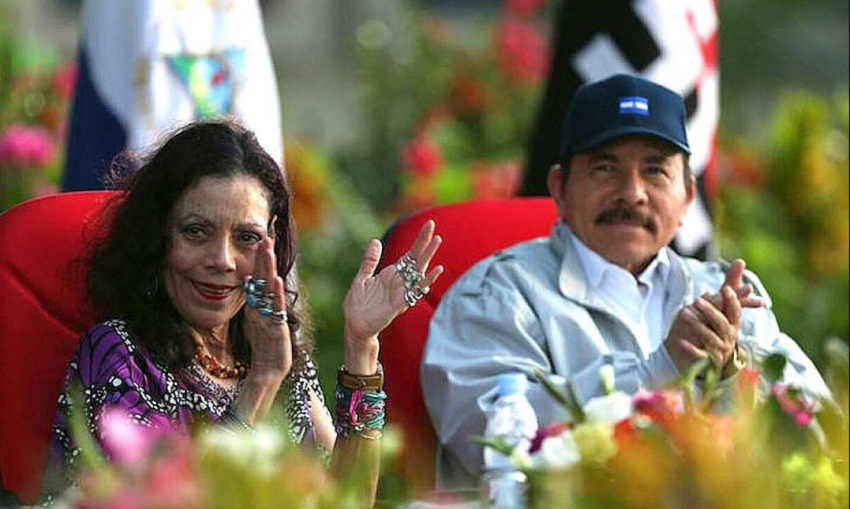

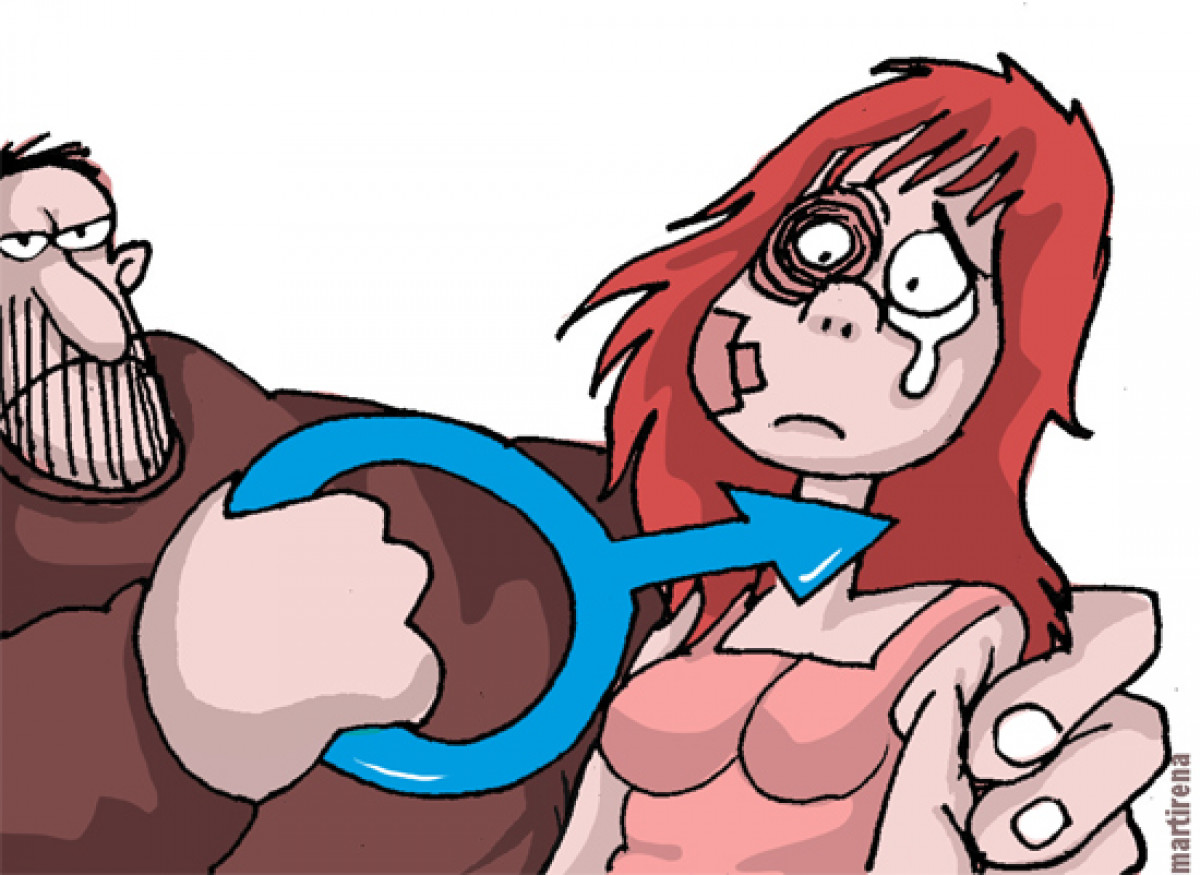
You must be logged in to post a comment.